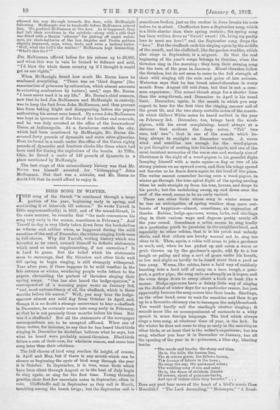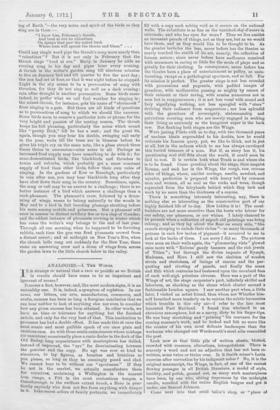BIRD SONG IN WINTER.
THE song of the thrush "is continued through a large portion of the year, beginning early in spring, and continuing it at intervals till autumn." So wrote Yarrell (a little ungrammatically) in 1839, and of the missel-thrush, in the same manner, be remarks that "the male commences his song very early in the season, sometimes in February." And Terrell to-day is very likely taken down from the bookshelves as witness and arbiter when, as happened during the mild sunshine of the end of December, the winter-singing birds were in full chorus. Why did Yarrell, writing history which was intended to be exact, commit himself to definite statements which need so much supplementing, if not correction P It is hard to guess. But the belief which his statements seem to encourage, that the thrushes and other birds wait till spring to begin singing, is still strangely widespread. Year after year, if there happens to be mild weather in the late autumn or winter, wondering people write letters to the papers . chronicling the portent of thrushes singing their spring songs. " One has also heard the hedge-sparrow," a correspondent of a morning paper wrote on January 3rd, " and, must extraordinary of all, the chaffinch, which is three months before his season." Well, you may hear the hedge- sparrow almost any mild day from October to April, and, though it is no doubt a strange occurrence to hear a chaffinch in December, he certainly comes into song early in February, so that he is not precisely three months before his time. But was it a chaffinch P Not all the statements of the newspaper correspondents are to be accepted offhand. When one of them writes, for instance, to say that he has heard blackbirds singing in December he doubtless believes what he says, but what ho beard were probably missel-thrushes. Blackbirds follow a rule of their own, for whatever reason, and come into song later than their relations.
The full chorus of bird song reaches its height, of course, in April and May, but if there is any month which can be chosen as beginning the cycle of bird song through the year it is October. In September, it is true, some birds which have been silent through August or in the heat of July begin to sing again, or sing for the first time. Young thrushes practise their first few uncertain notes in September, often in rain. Chiffchaffs call in September as they call in March, tumbling among the beech twigs; but the September call is
sometimes broken, just as the cuckoo in June breaks his note. before he is silent. Chaffinches have a September song, which is a little shorter than their spring roulade; the spring song has been written down as "Sweet! sweet ! Oh, bring my pretty love to meet me here?" and the September song drops the " here." But the chaffinch ends his singing again by the middle of the month, and the chiffchaff, like the garden-warbler, which also sings in September, is a migrant. So that the real
beginning of the year's songs belongs to October, when the thrushes sing in the morning : they keep their evening song, for the turn of the year in January. Missel-thrushes follow the thrushes, but do not seem to come to the full strength of: their wild singing till the rain and gales of late autumn..
Waterton says that be has heard missel-thrushes in every month from August till mid-June, but that is not a. com- mon experience. The missel-thrush sings for a shorter time than the song-thrush, and December to April is his usual limit. December, again, is the month in which you may expect to hear for the first time the ringing see-saw call of: the great tit, and the two sharp metallic notes of the marsh-. tit which Gilbert White notes he heard earliest in the year
on February 3rd. December, too, brings back the wood- pigeon, with his sweet complaining, heard always at a, distance that mellows the deep notes, "Talc' two, coos, tak' two" : that is one of the sounds which be-, long always to sunlight on December woods. A warm wind and sunshine are enough for the wood-pigeon, to put thoughts of nesting into his heart again, and one of the,
most insistent memories of the warm sun and westerly airs of Christmas is the sight of a wood-pigeon in his graceful flight. fancying himself with a mate again—a flap or two of his strong pinions on an upward curve, and then his wings spread out fanwise as he floats down again to the level of the pines. The writer cannot remember having seen a. wood-pigeon in winter go through the true spiral flight of the spring nesting when he sails straight up from his tree, hovers, and drops to, his perch; but the undulating sweep, up and down over the roof of the wood, seems to be an early variant.
There are other birds whose song in winter seems to be less an anticipation of spring weather than mere out-
bursts of happiness—almost, sometimes, an expression of thanks. Robins, hedge-sparrows, wrens, larks, and starlings. sing in their various ways and degrees pretty nearly all
the year round. Sometimes a robin seems to sing loudly on a particular perch to proclaim to the neighbourhood, and especially to other robins, that it is his perch and nobody else's, and that others are hereby warned not to sing to close to it. Then, again, a robin will come to join a gardener at work, and, when he has picked up and eaten a worm or grub thrown up by the gardener's spade, will fly to a low bough or paling and sing a sort of grace under his breath,, so low and slight as hardly to be heard more than a yard or two away. Wrens, like robins, have a bold way of suddenly
bursting into a loud trill of song on a bare bough, a gate- post, a gutter pipe; the song ends as abruptly as it began, and.
the wren drops down to creep about a bush or bank like a mouse. Hedge-sparrows have a dainty little way of singing on the dullest of winter days for no particular reason, but just; apparently because the song comes into their heads. Starlings, on the other hand, seem to wait for sunshine and then to go up to a favourite chimney rim to harangue the neighbourhood_ Youwould hardly call the starling's chatter singing ; ib sounds more like an accompaniment of castanets to a witty speech in some foreign language. The bird which alwaysl sings a true song, at whatever time of year, is the lark. In the winter he does not seem to sing so early in the morning as' other birds, or at least that is the writer's experience; but his: song, whether yen hear it in December or January, has all the opening of the year in it—primroses, a blue sky, bleating
lambs. The woods and brooks, the sheep and kine,
He is, the hills, the human line,
The m 'adows green, the fallows brown, TLe dreams of labour in the town ;
He sings the sap, the quickened veins; The wedding song of sun and rains
He is, the dance of children, thanks Of sowers, shout of primrose-banks,
And eye of violets while they breathe." , Does any poet bear more of the heart of a bird's music than. Meredith P " The Lark Ascending," " Melampus," " A Read-
ing of Earth "—the very notes and spirit of the birds as they sing are in them :-
"I know him, February's thrush,
And loud at eve ho valentines On sprays that paw the naked bush
Where soon will sprout the thorns and bins." . .
Could any single word pipe the thrush's song more nearly than "valentines " P But it is not only in February that the thrush sings "loud at eve." Early in January he adds an evening song to his day and pipes later every evening. A thrush in the writer's garden sang till nineteen minutes
to five on January 2nd and till quarter to five the next day ; the sun had set at four, so that it was night before he stopped. Light in the sky seems to be a provocative of song with thrushes, for they do not sing so well on a dark evening ; rain after drought is another provocative. Some birds seem, indeed, to prefer what we call foul weather for singing in ; the raissel-thrush, for instance, gets his name of " stormeock " from singing in a gale. But there are all kinds of questions as to provocatives of song to which we should like answers.
Some birds seem to reserve a particular note or phrase for the very height and passion of the nesting season. The thrush keeps his full phrasing, particularly the notes which sound like "pretty Dick," till he has a nest ; and the great tit, again, though you may hear his double, swinging call early in the year, waits till the trees are in blossom before he gives his triple cry on the same note, like a glass struck three times thrice in succession—nine notes in all. Perhaps an increased food supply may have something to do with it ; for semi-domesticated birds, like blackbirds and thrushes in towns and suburbs, which probably get a more constant supply of food than other birds, follow their own rules of singing. In the gardens of Kew or Ranelagh, particularly in rain after sun, you may hear blackbirds long after they have shut down their song in the country. Sometimes, again, the song or call may be an answer to a challenge ; there is no better instance of a bird which answers a challenge than a cock-pheasant. The pheasant's crow, followed by a drum-
ming of wings, seems to belong naturally to the woods in May and to a bird in full breeding plumage strutting before his mate among orchids and primroses. But a pheasant will crow in answer to distant artillery fire or to a clap of thunder; and the oddest instance of pheasants crowing in winter which has come the writer's way belongs to the end of last year. Through all one morning, when he happened to be ferreting rabbits, each time the gun was fired pheasants crowed from a distant covert ; and at midnight on New Year's Eve, when
the church belle rang out suddenly for the New Year, there came an answering crow and a drum of wings from across the garden lawn to the little church below in the valley.



















































 Previous page
Previous page